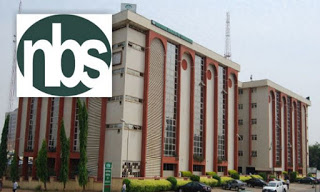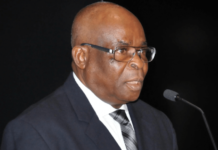By Alexis Akwagyiram and Chijioke Ohuocha
Data released by the National Bureau of Statistics (NBS) on Tuesday says Nigeria returned to growth in 2017 after suffering
its first recession in a generation the previous year.
its first recession in a generation the previous year.

According to the NBS data Nigeria’s gross domestic product (GDP) grew by 0.83 percent in 2017
after shrinking by 1.58 percent in 2016, which was its first annual
contraction in 25 years,
after shrinking by 1.58 percent in 2016, which was its first annual
contraction in 25 years,
(adsbygoogle = window.adsbygoogle || []).push({});
Nigeria fell into recession in
2016 largely as a result of low crude prices and militant attacks on
energy facilities in the Niger Delta. Crude sales make up two-thirds of
government revenue.
2016 largely as a result of low crude prices and militant attacks on
energy facilities in the Niger Delta. Crude sales make up two-thirds of
government revenue.
It returned to growth in the second
quarter of 2017 but the recovery has been fragile since it is largely
due to higher oil prices. The International Monetary Fund (IMF) warned in
December that the economy remains vulnerable.
quarter of 2017 but the recovery has been fragile since it is largely
due to higher oil prices. The International Monetary Fund (IMF) warned in
December that the economy remains vulnerable.
“The
growth rate still lags far behind where Nigeria should be,” said Razia
Khan, chief economist for Africa at Standard Chartered, although she
noted that the full-year growth was higher than the 0.7 percent forecast
by her bank.
growth rate still lags far behind where Nigeria should be,” said Razia
Khan, chief economist for Africa at Standard Chartered, although she
noted that the full-year growth was higher than the 0.7 percent forecast
by her bank.
“Unless the 2018 budget is approved soon
… higher oil prices alone are not going to be sufficient to provide a
really strong lift to the GDP numbers,” she said.
… higher oil prices alone are not going to be sufficient to provide a
really strong lift to the GDP numbers,” she said.
Nigeria’s
government has repeatedly said it intends to spend money on
infrastructure projects to diversify the OPEC member’s oil-dependent
economy.
government has repeatedly said it intends to spend money on
infrastructure projects to diversify the OPEC member’s oil-dependent
economy.
(adsbygoogle = window.adsbygoogle || []).push({});
President Muhammadu Buhari proposed an 8.6
trillion naira ($28 bln) budget for 2018, Nigeria’s biggest ever, to
lawmakers in November. They are still examining the plans, which need to
be returned to Buhari to be signed into law.
trillion naira ($28 bln) budget for 2018, Nigeria’s biggest ever, to
lawmakers in November. They are still examining the plans, which need to
be returned to Buhari to be signed into law.
Delays in passing budgets, amid wrangling between the executive and legislature, are common in Nigeria.
Budgets
under Buhari, who took office in May 2015, have been Nigeria’s largest
ever. But economists say that has not translated into the sort of
capital expenditure needed to boost the economy, such as improving
infrastructure.
under Buhari, who took office in May 2015, have been Nigeria’s largest
ever. But economists say that has not translated into the sort of
capital expenditure needed to boost the economy, such as improving
infrastructure.
Growth in the last quarter of 2017 rose
to 1.92 percent compared to a 1.73 percent contraction in the same
period of the previous year, according to the NBS data.
to 1.92 percent compared to a 1.73 percent contraction in the same
period of the previous year, according to the NBS data.
Oil
production rose to 1.91 million barrels a day (mbpd) in the fourth
quarter from 1.76 mbpd in the same period of 2016, the statistics office
said.
production rose to 1.91 million barrels a day (mbpd) in the fourth
quarter from 1.76 mbpd in the same period of 2016, the statistics office
said.
William Jackson, senior emerging markets
economist at Capital Economics, said the low headline growth “masked
significant shifts” within individual sectors.
economist at Capital Economics, said the low headline growth “masked
significant shifts” within individual sectors.
“Non-oil
GDP, which had contracted in Q3, returned to growth. This was largely
due to improved strength in the agricultural sector and the end of the
long contraction in wholesale and retail trade,” he wrote in a research
note. (Reuters)
GDP, which had contracted in Q3, returned to growth. This was largely
due to improved strength in the agricultural sector and the end of the
long contraction in wholesale and retail trade,” he wrote in a research
note. (Reuters)











